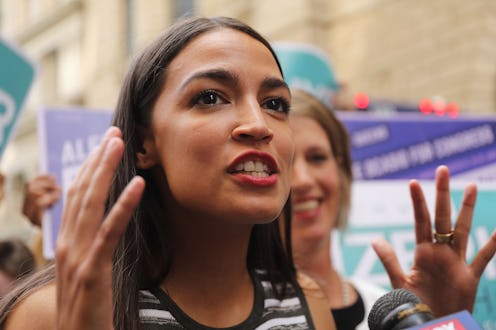News
What People Are Really Saying When They Call Alexandria Ocasio-Cortez “Radical”

In this op-ed, writer Mariana Viera explains how criticizing Alexandria Ocasio-Cortez as “radical” misses the mark — and reflects poorly on those critics.
When Anderson Cooper sat down with Congresswoman Alexandria Ocasio-Cortez on 60 Minutes in early January, he asked if she considered herself a “radical.” She replied, “It has only ever been radicals that have changed this country. If that’s what radical means, call me a radical,” before venturing further and adding: “What’s unrealistic is what we’re living in right now.” And she’s right.
Today, politicians continue to deny or downplay the effects of climate change even as scientists warn of catastrophic consequences. In one of the richest and most powerful countries in the world, tens of thousands of people die every year because they can’t afford health care, according to the American Journal of Public Health. On Christmas Eve, an 8-year-old child died from a flu while in U.S. Customs and Border Protection custody after a series of events that began with him simply being born in the wrong part of the world.
Meanwhile, Ocasio-Cortez has advocated for “radical” ideas like tuition-free college, livable wages, Medicare for all, and a nationwide transition to a carbon-free energy system by 2035. “What you’re talking about, just big picture, is a radical agenda compared to the way politics is done right now,” Cooper told her. When so much of this country finds ideas like these radical while deeming the current reality completely tolerable, the problem is certainly not that politics have shifted too far to the left. The problem is that the politics of this country have consistently and unrelentingly leaned toward injustice — except when people at the margins have worked tirelessly to tilt the scales.
Historically, the “radical” label — especially when attached to the poor, the non-white, the woman, or the otherwise disadvantaged — has been used to delegitimize the ideas of people working to chip away at the inequality that has defined this country for as long as it has existed. Radical thinkers are said to disregard realities like budgets, bureaucratic processes, and party politics in the name of absolutist political philosophies. They’re seen as naive and their ideas as frivolous, while “moderates”— politicians and critics who tend to be white and male — are positioned as level-headed and rational.
Part of the reason why Ocasio-Cortez has stirred panic among “establishment” politicians on both the right and the left is that she is in a position that was not meant for people like her.
Ocasio-Cortez’s politics are only unthinkable within the context of this country’s history of centering the rich, the white, and the male. Chattel slavery, the genocide of Native peoples, child labor, lynching, denying women participation in government: These events and decisions are what's defined the moral character of this country. Ocasio-Cortez’s ideas considered are only radical because they break with that morality, which insists on regarding some people inherently more worthy than others. And the use of the "radical" label as a pejorative says far more about the morals of the people using it than it does about the plausibility of the ideas she espouses.
Part of the reason why Ocasio-Cortez has stirred panic among “establishment” politicians on both the right and the left is that she is in a position that was not meant for people like her: a Latina woman from the Bronx with a working-class upbringing. In June 2018, she unseated ex-Democratic Caucus Chair Joe Crowley, one of the most powerful Democrats in the House of Representatives. The sheer amount of criticism and attention that she’s receiving reveals the great distance between traditional politics in this country and the kind of people she intends to serve.
Ocasio-Cortez is hyper-aware of the position that she’s in. She, like so many other “radicals” throughout American history, represents the very people who this government was designed to exclude. She’s working to shift the country’s moral compass to a place where respect for all human life — including those of all immigrants, poor people, women, and non-white communities — is the baseline, and the structural systems of inequality that persist today become “radical.” And that’s exactly what we need.